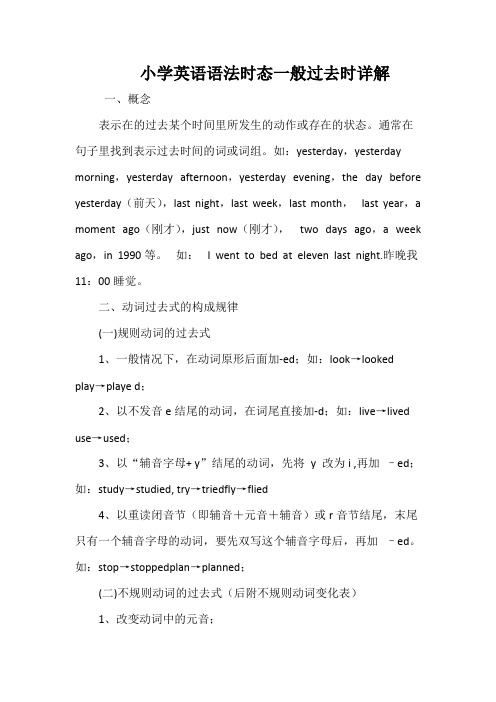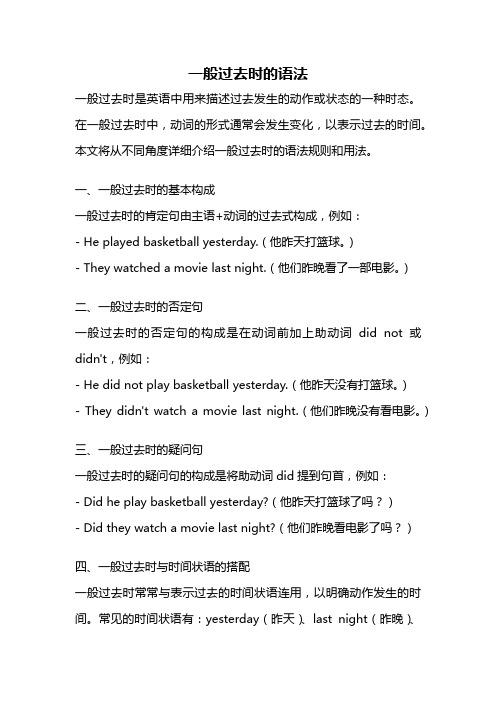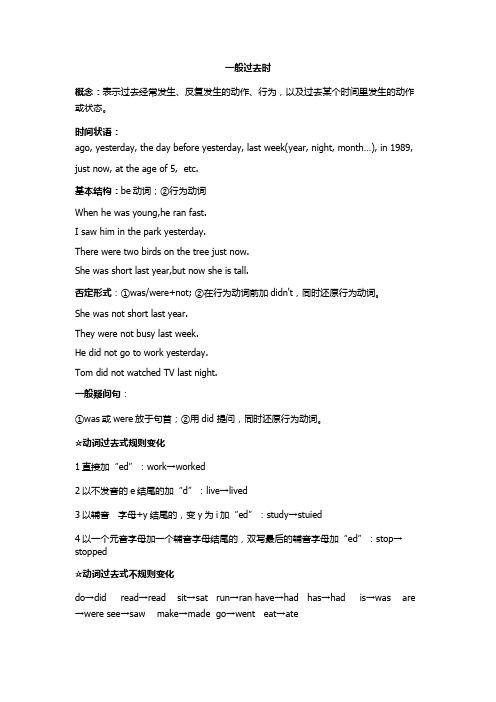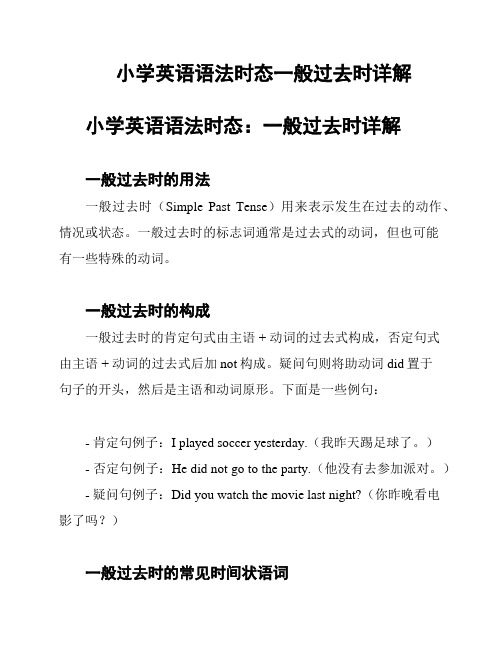小学语法经典总结---一般过去时2
英语一般过去时语法知识归纳总结

英语一般过去时语法知识归纳总结英语的一般过去时是用来表示发生在过去的动作、事件或状态。
在使用一般过去时时,我们需要注意动词的变化规则、时间状语的使用以及动作的描述。
一、动词的变化规则一般过去时中,动词的变化分为两种情况:一是一般动词的变化,二是不规则动词的变化。
1. 一般动词的变化一般动词在一般过去时中,大部分动词都需要加上-ed结尾来表示过去时。
例如:- walk → walked- play → played- study → studied在一些情况下,一般动词的末尾只需要加上-d结尾即可,以保持读音的规则。
例如:- love → loved- live → lived此外,一些以辅音字母+y结尾的动词,在变为过去时时需要把y变为i,并加上-ed结尾。
例如:- try → tried- carry → carried2. 不规则动词的变化不规则动词在一般过去时中的变化不遵循规则,需要记忆其特定的形式。
例如:- go → went- eat → ate- see → saw二、时间状语的使用时间状语可以用来表示动作发生的具体时间,在一般过去时中,使用不同的时间状语可以帮助我们更准确地描述过去的动作或事件。
例如:- yesterday(昨天)- last week(上周)- in 2005(在2005年)- when I was a child(当我还是个孩子时)三、动作的描述在使用一般过去时时,我们需要注意动作的描述,尽量使用简洁明了的语句来表达过去发生的事情。
同时,可以使用连词和逻辑词语来连接不同的句子,使文章更加连贯。
例如:- I went to the park yesterday. It was a sunny day.- We played football last week, but we lost the game.总结:英语一般过去时是用来表示过去发生的动作、事件或状态。
动词的变化规则分为一般动词和不规则动词两种情况,需要根据动词的不同形式来变化。
(完整)小学英语语法时态一般过去时详解

小学英语语法时态一般过去时详解一、概念表示在的过去某个时间里所发生的动作或存在的状态。
通常在句子里找到表示过去时间的词或词组。
如:yesterday,yesterday morning,yesterday afternoon,yesterday evening,the day before yesterday(前天),last night,last week,last month,last year,a moment ago(刚才),just now(刚才),two days ago,a week ago,in 1990等。
如:I went to bed at eleven last night.昨晚我11:00睡觉。
二、动词过去式的构成规律(一)规则动词的过去式1、一般情况下,在动词原形后面加-ed;如:look→looked play→playe d;2、以不发音e结尾的动词,在词尾直接加-d;如:live→lived use→used;3、以“辅音字母+ y”结尾的动词,先将y 改为i ,再加–ed;如:study→studied, try→triedfly→flied4、以重读闭音节(即辅音+元音+辅音)或r音节结尾,末尾只有一个辅音字母的动词,要先双写这个辅音字母后,再加–ed。
如:stop→stoppedplan→planned;(二)不规则动词的过去式(后附不规则动词变化表)1、改变动词中的元音;begin→began drink→drank come→came eat→ate grow→grew run→ran know→knew win→wonspeak→spoketake→took write→wrote get→got2、变词尾的–d 为–t ;build→built lend→lent send→sent spend→spent bend→bent3、与动词原形一样;cut→cut put→put cost→cost hurt→hurt shut→shut4、变-ay 为-aid (少数动词);say→said pay→paid lay→laid5、采用不同词根;sell→sold teach→taught buy→bought6、其他。
小学一年级英语一般过去时的语法学习

小学一年级英语一般过去时的语法学习一、什么是一般过去时?一般过去时表示过去发生的动作或状态,通常使用过去式动词来表达。
比如:•I ate breakfast at 7 am this morning.•She played basketball with her friends yesterday.二、一般过去时的构成一般过去时的构成主要取决于动词的不规则变化规则。
通常来说,动词加上-ed就可以构成过去时。
但是也有很多不规则动词需要我们特别注意。
下面是一些表示不规则变化的动词:•be -> was/were•have -> had•go -> went•eat -> ate•see -> saw•do -> did•etc.三、使用一般过去时的语境1.过去发生的事情当我们表达过去发生的事情时,通常要使用一般过去时。
示例:•We went to the park last Sunday.•She studied English hard for the test.2.过去的经历当我们讲述自己或别人的过去经历时,也要使用一般过去时。
示例:•When I was six years old, I lived in a small village.•My grandfather traveled around the world when he was young.3.过去的习惯当我们谈论过去的习惯或常态时,也要使用一般过去时。
示例:•She always walked to school when she was a child.•We usually ate dinner at home every day.四、注意事项1.一些不规则动词的过去时形式需要特别记忆,例如go->went,see->saw等。
2.有些动词在过去式和现在分词时形式相同,但是用法不同,例如read。
小学语法讲解--一般过去时2

一般过去时理论讲解1.一般过去时表示过去某个时间发生的动作或存在的状态,也表示过去经常或反复发生的动作。
常与表示过去的时间状语(one day,once,yesterday,last week,last month,an hour ago,long ago,in 2000)连用。
如:He had a meeting yesterday afternoon.他昨天下午开会。
She joined the Party in 1998.她在1998年加入中国共产党。
2.Be动词在一般过去时中的变化:⑴am 和is在一般过去时中变为was。
(was not=wasn’t)3.有行为动词,借用助动词did.否定句:didn’t +动词原形,如:Jim didn’t go home yesterday.一般疑问句:在句首加did,句子中的动词过去式变回原形。
如:Did Jim go home yesterday?特殊疑问句:⑴疑问词+did+主语+动词原形?如:What did Jim do yesterday? 4、词过去式变化规则:1.一般在动词末尾加-ed,如:pull- , cook- ,answer-2.结尾是e加d,如:taste- ,move-3.末尾只有一个元音字母和一个辅音字母的重读闭音节,应双写末尾的辅音字母,再加-ed,如:stop-4.以“辅音字母+y”结尾的,变y为i,再加-ed,如:study- carry- 5.不规则动词过去式:am, is-was, are-were, do-did, see-saw, say-said, give-gave, get-got, go-went, come-came, have-had, eat-ate, take-took, run-ran, sing-sang, put-put, make-made, read-read, write-wrote, draw-drew, drink-drank, fly-flew, ride-rode, speak-spoke, sweep-swept, swim-swam, sit-sat过去时练习:写出下列动词的过去式is\am_________ fly_______ plant________ are ________ drink_________play_______ go________ make ________ does_________ dance________ worry________ ask _____ taste_________ eat__________ draw________put ______ throw________ kick_________ pass_______ do ________Be动词的过去时练习一、用be动词的适当形式填空。
一般过去时的语法

一般过去时的语法一般过去时是英语中用来描述过去发生的动作或状态的一种时态。
在一般过去时中,动词的形式通常会发生变化,以表示过去的时间。
本文将从不同角度详细介绍一般过去时的语法规则和用法。
一、一般过去时的基本构成一般过去时的肯定句由主语+动词的过去式构成,例如:- He played basketball yesterday.(他昨天打篮球。
)- They watched a movie last night.(他们昨晚看了一部电影。
)二、一般过去时的否定句一般过去时的否定句的构成是在动词前加上助动词did not或didn't,例如:- He did not play basketball yesterday.(他昨天没有打篮球。
)- They didn't watch a movie last night.(他们昨晚没有看电影。
)三、一般过去时的疑问句一般过去时的疑问句的构成是将助动词did提到句首,例如:- Did he play basketball yesterday?(他昨天打篮球了吗?)- Did they watch a movie last night?(他们昨晚看电影了吗?)四、一般过去时与时间状语的搭配一般过去时常常与表示过去的时间状语连用,以明确动作发生的时间。
常见的时间状语有:yesterday(昨天)、last night(昨晚)、last week(上周)、in 2010(在2010年)等等。
五、一般过去时的用法1. 表示过去发生的动作或状态She lived in New York for five years.(她在纽约住了五年。
)2. 表示过去经常或反复发生的动作He often went swimming when he was young.(他年轻时经常去游泳。
)3. 表示过去的习惯或常态She always cooked dinner for her family.(她过去总是为家人做晚饭。
小学英语语法一般过去时总结及练习

一般过去时概念:表示过去经常发生、反复发生的动作、行为,以及过去某个时间里发生的动作或状态。
时间状语:ago, yesterday, the day before yesterday, last week(year, night, month…), in 1989, just now, at the age of 5, etc.基本结构:be动词;②行为动词When he was young,he ran fast.I saw him in the park yesterday.There were two birds on the tree just now.She was short last year,but now she is tall.否定形式:①was/were+not; ②在行为动词前加didn't,同时还原行为动词。
She was not short last year.They were not busy last week.He did not go to work yesterday.Tom did not watched TV last night.一般疑问句:①was或were放于句首;②用did 提问,同时还原行为动词。
☆动词过去式规则变化1直接加“ed”:work→worked2以不发音的e结尾的加“d”:live→lived3以辅音字母+y结尾的,变y为i加“ed”:study→stuied4以一个元音字母加一个辅音字母结尾的,双写最后的辅音字母加“ed”:stop→stopped☆动词过去式不规则变化do→did read→read sit→sat run→ran have→had has→had is→was are →were see→saw make→made go→went eat→ate一般过去时的练习一、用所给的动词的适当形式填空。
⒈He ___________(visit) the Great Wall last year.2.We____________(have) a good time yesterday.3.We often __________(go) to school by bus last year.4.I __________(live)in the village when I was a child.5.Mike__________(see) a big tiger in the nature park last year.6.Sam___________ (do) the housework yesterday.7.________(do) you _________(enjoy) yourself yesterday?8.________(do)you __________(play) the violin in the artroom yesterday?9.I __________ (eat) a big pizza yesterday.10.There_________ (be) many sheep on the farm last year.11. I _________ (watch) a cartoon on Saturday.12. Her father __________ (read) a newspaper last night.13. We _________ to zoo yesterday, we ___________ to the park. (go)14. _________ you __________ (visit) your relatives last Spring Festival?15. _________ he __________ (fly) a kite on Sunday? Yes, he __________.二、单项选择( ) 1. She watered the flowers ________.A tomorrowB sometimesC yesterday morning( ) 2.What ____ Mike do last weekend ?A doB doesC did( ) 3. I ___ my room last Sunday.A cleanedB cleanC am cleaning( ) 4. _____ you _____ TV last night .A Do, watchB Did, watchC Did, watched( ) 5.---Did your father write an e-mail yesterday ?A Yes, he did.B Yes, he doesC No, he don’t( ) 6.They _____ on a trip in February ,2007.A are goingB goingC went( ) 7. ____ he ____ football two days ago?A Does , playB Did , playedC Did , play三、Be动词的过去时练习(一)用be动词的适当形式填空。
小学英语语法时态一般过去时详解

小学英语语法时态一般过去时详解小学英语语法时态:一般过去时详解一般过去时的用法一般过去时(Simple Past Tense)用来表示发生在过去的动作、情况或状态。
一般过去时的标志词通常是过去式的动词,但也可能有一些特殊的动词。
一般过去时的构成一般过去时的肯定句式由主语 + 动词的过去式构成,否定句式由主语 + 动词的过去式后加not构成。
疑问句则将助动词did置于句子的开头,然后是主语和动词原形。
下面是一些例句:- 肯定句例子:I played soccer yesterday.(我昨天踢足球了。
)- 否定句例子:He did not go to the party.(他没有去参加派对。
)- 疑问句例子:Did you watch the movie last night?(你昨晚看电影了吗?)一般过去时的常见时间状语词一般过去时通常会和一些时间状语词一起使用,以明确动作发生的具体时间。
以下是一些常见的时间状语词:- yesterday(昨天)- last week(上周)- two days ago(两天前)- in 1998(在1998年)一般过去时的特殊用法一般过去时有一些特殊的用法需要注意:1. 表示过去经常性的动作或惯。
例如:When I was young, I played soccer every day.(当我年轻时,我每天都踢足球。
)2. 表示过去事实或真理。
例如:The earth revolved around the sun.(地球绕太阳转。
)总结一般过去时用来描述发生在过去的动作、情况或状态。
它的构成简单,使用过去式的动词作为标志词。
通过加入时间状语词,可以更明确地指出动作发生的具体时间。
同时,一般过去时还有一些特殊的用法,需要灵活运用。
>注意:本文内容仅供参考,具体使用时请根据实际情况和教材要求进行调整。
(完整)英语一般过去时语法知识归纳总结(2),推荐文档

一般过去时语法知识一般过去时表示过去某个时间发生的动作或状态;过去习惯性、经常性的动作、行为;主语在过去时间段所具备的能力和性格。
一般过去时句子最明显的现象就是常由表达过去时间的副词、副词短语或从句来界定。
“过去”的概念并不仅指如“yesterday, last week,……”等,实际上...“.非现在......“.与现在对立的过去........”.,亦即的以前..”.形成对立,就必...............“.现在...........“.过了说话时间的几分钟之前............”.,只要所要表达的时间与说话时的...”.,哪怕是须使用一般过去时来表达。
............例如:He was here only a few minutes ago. 仅仅几分钟前他还在这里。
I came home just now. 我刚回到家。
“this + 时间,today”等时间副词常用于修饰一般现在时,但是只要..........”.对立,..句子的本意是......“.与说话时的现在即使句子中有..必须使用一般过去时。
..........例如:......“.th..i.s. + .时间,....,也.....”.等.时间副词...todayI got up very early this morning. 今天早晨我起床很早。
He was late for school again today. 今天他又迟到了。
强化理解:1. 一般过去时表示在过去某个特定时刻或时期所发生的事情,也可以表示过去习惯性、经常性的动作。
一般过去时只说明过去的事情...........。
..............,.不强调动作对现在的影响I had a word with Julia this morning. 今天早晨,我跟朱丽亚说了几句话。
He smoked many cigarettes a day until he gave up. 他没有戒烟的那阵子,抽烟抽得可凶了。
- 1、下载文档前请自行甄别文档内容的完整性,平台不提供额外的编辑、内容补充、找答案等附加服务。
- 2、"仅部分预览"的文档,不可在线预览部分如存在完整性等问题,可反馈申请退款(可完整预览的文档不适用该条件!)。
- 3、如文档侵犯您的权益,请联系客服反馈,我们会尽快为您处理(人工客服工作时间:9:00-18:30)。
初英语语法复习及练习:一般过去时1.一般过去时表示过去某个时间发生的动作或存在的状态,常和表示过去的时间状语连用。
一般过去时也表示过去经常或反复发生的动作感谢。
2.Be动词在一般过去时中的变化:⑴am 和is在一般过去时中变为was。
(was not=wasn’t)⑵are在一般过去时中变为were。
(were not=weren’t)⑶带有was或were的句子,其否定、疑问的变化和is, am, are一样,即否定句在was 或were后加not,一般疑问句把was或were调到句首。
3.句中没有be动词的一般过去时的句子否定句:didn’t +动词原形,如:Jim didn’t go home yesterday.一般疑问句:在句首加did,句子中的动词过去式变回原形。
如:Did Jim go home yesterday?特殊疑问句:⑴疑问词+did+主语+动词原形?如:What did Jim do yesterday?⑵疑问词当主语时:疑问词+动词过去式?如:Who went to home yesterday?动词过去式变化规则:1.一般在动词末尾加-ed,如:pull-pulled, cook-cooked2.结尾是e加d,如:taste-tasted3.末尾只有一个元音字母和一个辅音字母的重读闭音节,应双写末尾的辅音字母,再加-ed,如:stop-stopped4.以“辅音字母+y”结尾的,变y为i,再加-ed,如:study-studied过去时练习写出下列动词的过去式is\am_________ fly_______ plant________ are ________drink_________ play_______ go________ make ________does_________ dance________ worry________ ask _____taste_________ eat__________ draw________ put ______throw________ kick_________ pass_______ do ________Be动词的过去时练习(1)一、用be动词的适当形式填空1. I _______ at school just now.2. He ________ at the camp last week.3. We ________ students two years ago.4. They ________ on the farm a moment ago.5. Yang Ling ________ eleven years old last year.6. There ________ an apple on the plate yesterday.7. There ________ some milk in the fridge on Sunday.8. The mobile phone _______ on the sofa yesterday evening.二、句型转换1. It was exciting.否定句:________________________________________________ 一般疑问句:____________________________________________ 肯、否定回答:__________________________________________ 2. All the students were very excited.否定句:________________________________________________ 一般疑问句:____________________________________________ 肯、否定回答:__________________________________________3. They were in his pocket.否定句:________________________________________________一般疑问句:____________________________________________肯、否定回答:__________________________________________Be动词的过去时练习(2)一、用be动词的适当形式填空1. I ______ an English teacher now.2. She _______ happy yesterday.3. They _______ glad to see each other last month.4. Helen and Nancy ________ good friends.5. The little dog _____ two years old this year.6. Look, there ________ lots of grapes here.7. There ________ a sign on the chair on Monday..8. Today _____ the second of June. Yesterday ______ the first of June. It _____ Children’s Day. All the students ______ very excited.二、句型转换1. There was a car in front of the house just now.否定句:________________________________________________一般疑问句:____________________________________________肯、否定回答:__________________________________________肯、否定回答:__________________________________________三、中译英1.我的故事书刚才还在手表旁边。
___________________________________________________________2.他们的外套上个礼拜放在卧室里了。
___________________________________________________________3.一会以前花园里有两只小鸟。
___________________________________________________________英语单词愁眉不展的didHi!Dear friends! 大家都认识我吧,我是助动词did,我的最大特点就是善解人意、助人为乐嘛!可是呀,有时我的心情会很糟糕!这是因为一些粗心的朋友不理解我。
现在我想把我的烦恼说出来,希望大家能够关心我,别再令我烦恼了,OK?1. 到底何时使用我?我和其它助动词一样,本身无意义,自己不能独立作谓语,只能和其它主要动词一起构成谓语,用于构成一般过去时的否定句和疑问句,当然也常常用于代替上文中的行为动词的过去式。
如:I didn't go to school last Sunday. 上周日我没上学。
Did you buy a new pen yesterday? 昨天你买了枝新钢笔吗?2.我身后的动词到底用什么形式?有的小朋友总不注意我身后的动词用什么形式,你说我多么烦恼呀!其实,在否定句和疑问句中,我身后的动词必须用原形。
不信你来瞧:他昨天没有在家吃午饭。
[误] He didn't had lunch at home yesterday.[正] He didn't have lunch at home yesterday.3. 我能用be动词代替吗?不管怎么说,含有行为(实义)动词的一般过去时的肯定句变成否定句或疑问句时,不能用be动词,必须用到我!含be动词的句子构成否定句或疑问句都绝不会让我露面!有的小朋友总是让我委屈、让我烦,还是看看例句吧:They went to the park last week. (改为否定句)[误] They weren't go to the park last week.[正] They didn't go to the park last week.朋友们这次了解我了吧,今后可别再出错啦,否则我一定会更加愁眉不展的!OK, see you next time!行为动词的过去时练习(1)一、用行为动词的适当形式填空1. He _________ (live) in Wuxi two years ago.2. The cat ________ (eat) a bird last night.3. We _______ (have) a party last Halloween.4. Nancy ________ (pick) up oranges on the farm last week.5. I ________ (make) a model ship with Mike yesterday.6. They ________ (play) chess in the classroom last PE lesson.7. My mother _______ (cook) a nice food last Spring Festival.8. The girls ________ (sing) and _______ (dance) at the party.二、句型转换1. Su Hai took some photos at the Sports day.否定句:________________________________________________一般疑问句:____________________________________________肯、否定回答:__________________________________________2. Nancy went to school early.否定句:________________________________________________一般疑问句:____________________________________________肯、否定回答:__________________________________________3. We sang some English songs.一般疑问句:____________________________________________肯、否定回答:__________________________________________行为动词的过去时练习(2)Name ____________ No. ______ Date __________一、用be动词的适当形式填空1. I ______ (watch) a cartoon on Saturday.2. Her father _______ (read) a newspaper last night.3. We _________ to zoo yesterday, we _____ to the park. (go)4. ______ you _______ (visit) your relatives last Spring Festival?5. ______ he _______ (fly) a kite on Sunday? Yes, he ______.6. Gao Shan _______ (pull) up carrots last National Day holiday.7. I ____________ (sweep) the floor yesterday, but my mother ______.8. What ______ she _______ (find) in the garden last morning? She __________ (find) a beautiful butterfly.二、句型转换1. They played football in the playground.否定句:________________________________________________一般疑问句:____________________________________________肯、否定回答:__________________________________________三、中译英1. 格林先生去年住在中国。
